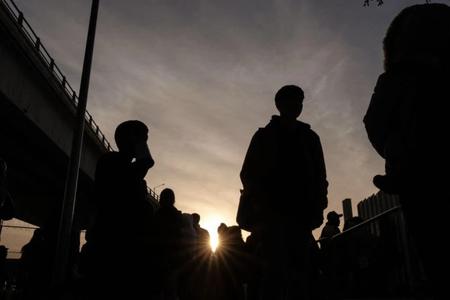Trump Signs Executive Orders to Begin Implementing Tough Immigration Policies| National Catholic Register
President Donald Trump on Monday signed a series of executive orders on immigration, including several that put into motion his campaign promise to carry out mass deportations of people residing in the U.S. illegally — a plan numerous Catholic...




President Donald Trump on Monday signed a series of executive orders on immigration, including several that put into motion his campaign promise to carry out mass deportations of people residing in the U.S. illegally — a plan numerous Catholic leaders, including Pope Francis, have criticized as unjust.
Among the orders Trump signed Jan. 20 were a declaration of a national emergency at the southern border, a reinstatement of the controversial “remain in Mexico” policy from his previous term, and a designation of drug cartels as “foreign terrorist organizations.”
The president also signed an order setting in motion a process to end birthright citizenship for individuals born within U.S. territory irrespective of the legal status of their parents, an action Trump has repeatedly promised despite birthright citizenship being provided for by the 14th Amendment.
There are an estimated 11.7 million undocumented immigrants in the U.S., according to July 2023 statistics from the Center for Migration Studies.
Trump’s platform proposed to begin efforts at “the largest deportation operation in American history” by prioritizing the deportation of “the most dangerous criminals” and working with local police.
In his inauguration speech, Trump said he would invoke the Alien Enemies Act of 1798 — most recently used, infamously, to intern Japanese Americans during World War II — to remove any gang members, drug dealers, or cartel members who are in the U.S. illegally.
Trump’s immigration plans have attracted criticism from some Catholics even as far away as the Vatican.
In an Italian television interview on Sunday, Pope Francis strongly condemned Trump’s mass deportation plans in the United States, saying “if this is true it is a disgrace,” highlighting the unfairness of punishing the most vulnerable.
The U.S. Conference of Catholic Bishops (USCCB) in November issued a statement that urged the American government to reform the immigration system with “fair and humane treatment” of immigrants. Ahead of Trump’s signing of the orders Monday night, the USCCB released a brief statement saying the “conference will be carefully reviewing the executive orders” and that the bishops “will work with the Trump administration as well as the U.S. Congress to advance the common good for all, which will include instances of agreement as well as disagreement.”
“The Catholic Church’s foundational teaching calls us to uphold the sacredness of human life and the God-given dignity of the human person. This means that the care for immigrants, refugees, and the poor is part of the same teaching of the Church that requires us to protect the most vulnerable among us, especially unborn children, the elderly, and the infirm,” the statement reads.
Several U.S. bishops have also indicated they would “speak out forcefully” if Trump’s immigration plans are implemented in a way that undermines human dignity.
In addition, Catholic and other Christian leaders have spoken out with “grave concern” over Trump’s plans to end a long-standing U.S. Immigration and Customs Enforcement (ICE) policy requiring ICE agents to seek their superior’s approval before arresting people at “sensitive locations” such as churches, hospitals, or schools.
Paul Hunker, a Catholic and an immigration attorney, told CNA that Trump’s promise to invoke the Alien Enemies Act 1798 concerns him as it could be used to “round up people without due process.” He also opined that Trump’s order declaring an emergency at the border is “illegal.”
“President Trump justifies his authority by claiming there is an ‘invasion’ of the United States. However, irregular immigration does not constitute an invasion by a foreign power,” he told CNA.
He said many of his clients are already concerned about Trump’s immigration actions and speculated that many people will self-deport if they cannot get good legal advice.
Hunker said he thinks it is likely that Trump’s attempts to end birthright citizenship will be rebuffed by the courts due to conflict with the 14th Amendment.
He further argued that Trump’s reinstatement of the “Remain in Mexico” policy — whereby immigrants with legitimate asylum claims will have to wait in Mexico for long periods, often in poor conditions — may backfire as Mexico will need to cooperate with such a policy.
Apprehensions at the southern border are already down significantly due to policies put in place by former President Joe Biden, he noted, and the fact that Trump has effectively shut down the ability for refugees to seek asylum — including the halting use of the CBP One mobile app, which asylum seekers can use to schedule appointments — will likely lead to fewer people attempting to cross.
“Some of the orders seem almost, legally or practically, to end a person’s ability to claim asylum at the border,” Hunker said.
“This contradicts our nation’s legal responsibility to consider a noncitizen’s claim that he fears persecution. I hope soon a federal court strikes this down.”
Chicago archbishop slams planned deportations
Chicago is rumored to be the epicenter of the first of the ICE raids under Trump. Cardinal Blase Cupich of Chicago on Sunday strongly condemned the new administration’s impending mass deportations targeting Chicago’s immigrant population.
While emphasizing the moral imperative for faith communities to defend the vulnerable, Cardinal Cupich described mass deportations as a violation of human dignity and a betrayal of American ideals, echoing Pope Francis’ call for humane migration policies.
“Government has the responsibility to secure our borders and keep us safe. We support the legitimate efforts of law enforcement to protect the safety and security of our communities — criminality cannot be countenanced, when committed by immigrants or longtime citizens,” the prelate said.
“But we also are committed to defending the rights of all people and protecting their human dignity,” he said.
“Millions of migrants flee their homelands for safer shores precisely because it is a life or death issue for them and their children. For members of faith communities, the threatened mass deportations also leave us with the searing question: ‘What is God telling us in this moment?’”
“People of faith are called to speak for the rights of others and to remind society of its obligation to care for those in need,” Cupich said.
“If the indiscriminate mass deportation being reported were to be carried out, this would be an affront to the dignity of all people and communities, and deny the legacy of what it means to be an American,” he concluded.














